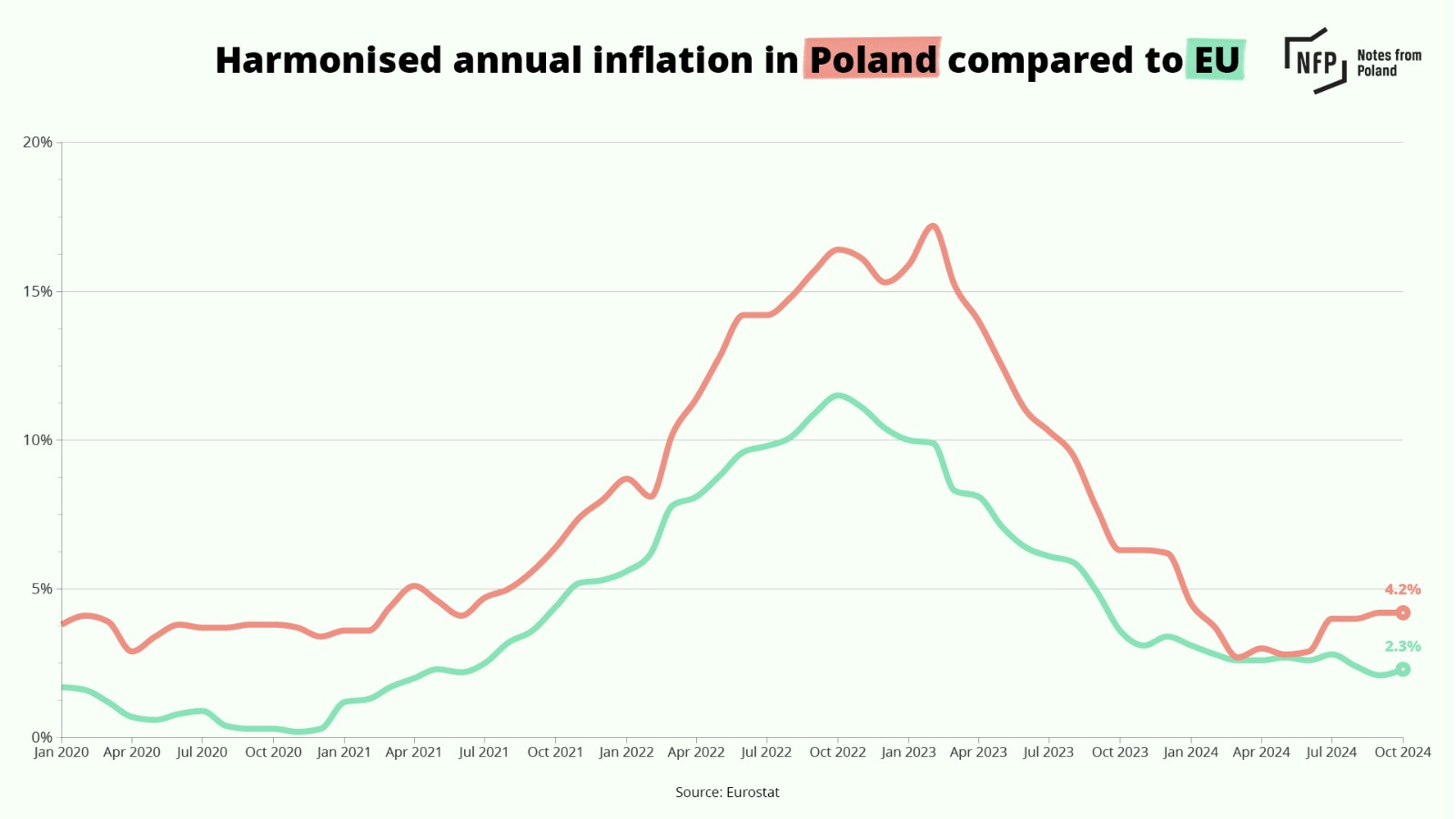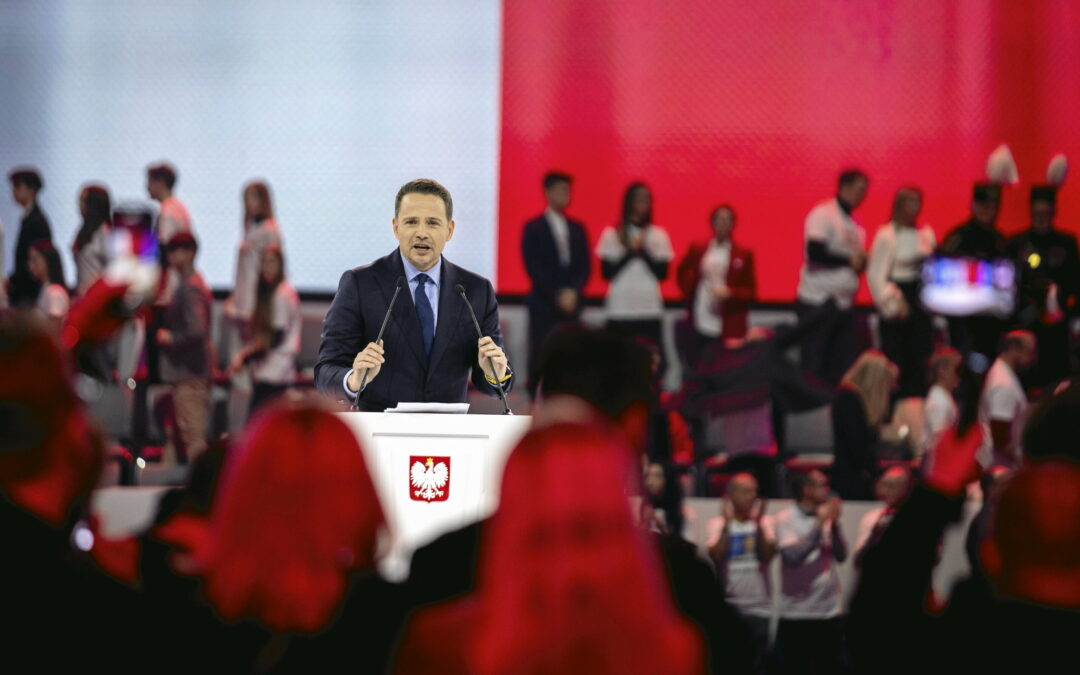Keep our news free from ads and paywalls by making a donation to support our work!

Notes from Poland is run by a small editorial team and is published by an independent, non-profit foundation that is funded through donations from our readers. We cannot do what we do without your support.
The presidential candidate of Poland’s main ruling party, Rafał Trzaskowski, has outlined the priorities for his campaign, including ending the near-total abortion ban, increasing defence spending, and tackling inflation.
Speaking at a convention of the centrist Civic Coalition (KO) – at which he was introduced by Prime Minister Donald Tusk – Trzaskowski asked Poles to imagine how the country might look today if he had won the 2020 presidential elections, when he was narrowly defeated by Andrzej Duda, the conservative incumbent.
“There would be no embarrassment on the international stage, huge inflation, destruction of Polish schools, medieval anti-abortion law,” said Trzaskowski. “We will not allow that, women must decide about their lives and health.”
Drogi Rafale, Panie Prezydencie, jesteś jedyny, który może dziś zjednoczyć Ojczyznę i pojednać nas wszystkich, od Gdańska po Śląsk. ❤️CAŁA POLSKA NAPRZÓD!🇵🇱 pic.twitter.com/vs7oiKPoYb
— Donald Tusk (@donaldtusk) December 7, 2024
Although Duda has often expressed his opposition to abortion, he was in fact not involved in the introduction of the near-total ban on abortion, which was carried out by the Constitutional Tribunal (TK). The president had previously sworn in conservative TK judges, though that happened before the 2020 presidential elections.
The KO-led government that took power at the end of last year – ending eight years of rule by the national-conservative Law and Justice (PiS) party, with which Duda is aligned – has pledged to liberalise the abortion law.
However, it has failed to agree on how to do so, amid differences between the more liberal and conservative elements of the ruling coalition. Prime Minister Donald Tusk recently admitted that it may not be possible to pass an abortion bill during the current parliamentary term.
Prime Minister @donaldtusk has admitted that there will not be a majority for the liberalisation of Poland’s abortion law during the current parliamentary term.
In its 2023 election campaign, Tusk's KO pledged to end the country’s near-total abortion banhttps://t.co/IGPrCdL6ew
— Notes from Poland 🇵🇱 (@notesfrompoland) August 26, 2024
Speaking on Saturday, Trzaskowski – who was named as KO’s presidential candidate last month – declared that there should be a “whole package of laws ready” for him to sign “in the first hours, the first days, after we win the presidential elections”.
He also declared that “one of the first laws I will sign if you elect me as president will be the law on the Silesian language”. In May, Duda vetoed a law that would have recognised Silesian as a regional language, allowing it to be taught in schools and used in local administration.
Trzaskowski, who currently serves as mayor of Warsaw, also called for Poland to further strengthen its armed forces – of which he would be commander-in-chief as president. He said that he wants defence spending to reach 5% of GDP in 2026.
This year, Poland is spending 4.1% of GDP on defence, which is by far the highest relative level in NATO and more than double the alliance’s 2% guideline target. The government plans for the figure to reach 4.7% in 2025.
During his speech, Trzaskowski also outlined his aim to “ensure that the Polish economy regains its competitiveness” after a decade in which “PiS, instead of focusing on the well-being of citizens, was concerned with creating a new caste of millionaires with our money”.
He also claimed that inflation had reached 20% under the PiS government (in fact, it peaked at 18.4% in March 2023) and pledged to “end the politicisation and incompetence in the National Bank of Poland”.
The central bank’s president has since 2016 been Adam Glapiński, a close personal associate of PiS chairman Jarosław Kaczyński. “Ten zloty for a stick of butter – that is what Glapiński has brought about,” said Trzaskowski. “I will not allow it!”
After peaking in spring 2023, inflation then fell rapidly, dropping below 4% in February 2024 for the first time in three years. However, it has since risen again slightly, to among the highest levels in the EU, in particular after the Tusk government partially unfroze energy prices in July.

Elsewhere in his speech, Trzaskowski pledged to ensure that Poland remains an “agricultural powerhouse”. Recent weeks have seen protests by Polish farmers, in particular against a proposed free trade deal between the European Union and the South American Mercosur bloc.
Trzaskowski criticised the EU, warning that it “cannot impose standards that hit our agricultural producers, while at the same time allowing food from China”, reports Business Insider Polska.
He also pledged to support the development of both nuclear and renewable energy, policies that have been pursued under both the former PiS government and the current Tusk administration.
Poland has announced that it will not support a proposed free trade agreement between the EU and the South American Mercosur bloc in its current form.
It fears that the deal will harm Polish farmers. France has opposed it for the same reason https://t.co/E0uH9rVB23
— Notes from Poland 🇵🇱 (@notesfrompoland) November 26, 2024
Though Poland’s president has little influence in formulating policy or legislation, they can veto bills passed by parliament. That power has been used by Duda to stymie the agenda of Tusk’s government. His second and final term in office ends next year.
The first round of the elections to choose his replacement will be held in May. If no candidate wins over 50% of the vote, a second-round run-off between the top two candidates will be held.
Trzaskowski’s chief rival is Karol Nawrocki, a non-party candidate being supported by PiS. The other main candidates so far are Szymon Hołownia, leader of Poland 2050 (Polska 2050), one of the parties in the ruling coalition, and Sławomir Mentzen of the far-right Confederation (Konfederacja) party.
Officially, the campaign will not begin until the election is formally called next month. However, candidates are already crisscrossing the country carrying out an unofficial “pre-campaign”.
In an unusual move, Poland's main opposition, the national-conservative PiS, has named someone from outside the party as their presidential candidate.
They picked Karol Nawrocki, who currently serves as head of the Institute of National Remembrance (IPN) https://t.co/F82Sig4zeK
— Notes from Poland 🇵🇱 (@notesfrompoland) November 24, 2024

Notes from Poland is run by a small editorial team and published by an independent, non-profit foundation that is funded through donations from our readers. We cannot do what we do without your support.
Main image credit: Grzegorz Celejewski / Agencja Wyborcza.pl




















